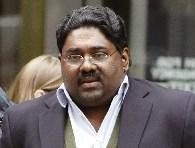 | « Back to article | Print this article |
 It's hard to fathom why billionaires like Rajaratnam stake their reputation for tiny additions to their wealth, writes A V Rajwade.
It's hard to fathom why billionaires like Rajaratnam stake their reputation for tiny additions to their wealth, writes A V Rajwade.
Is it something in their genes or training or just a co-incidence? Recent research does suggest that genes do have something to do with aggressive risk-taking - it seems that the reason why most big risk-takers in trading rooms are male is their testosterone. Does it strengthen the tendency to gamble and speculate, to seek thrills, which makes the adrenalin rush?
The provocation for these thoughts has been a series of reports in the financial media about the insider-trading allegations against Raj Rajaratnam (and 20 other individuals). Billionaire Rajaratnam, a Tamil of Sri Lankan origin, is a hedge fund manager, and promoter of the Galleon Group.
Galleon was one of the largest hedge funds, boasting a capital of $7 billion at its peak last year. (Galleon is currently being wound up.) With $20 million earned through insider trading, this seems to be the biggest such scandal in hedge funds.
It is intriguing why a billionaire fund manager would risk criminal charges and his entire reputation to earn such a relatively paltry sum. (Rajaratnam had chosen to register his fund with the Securities and Exchange Commission even when there was no compulsion on him to do so. He also contributed funds to many charities, particularly those supporting causes in Sri Lanka.)
Those charged along with him include current or former senior executives at IBM, Intel, McKinsey, Moody's, Bear Stearns, etc. some of them obviously of Indian origin (One of them is a co-founder of the Indian School of Business in Hyderabad).
Insider trading does seem to persist even in supposedly mature and well-regulated equity markets. (One example of this is a well-documented fact that unusual/suspicious trading has been seen in one out of four takeover bids, just before their announcement.)
Apart from this, it is a fact that Galleon was an aggressive trader in the market, averaging more than a thousand trades a day. Also, the dividing line between legitimate research and illegitimate insider trading is fairly thin. Seeking information from all possible sources, including investors who may be senior executives in business firms, sometimes aggressively, is the lifeblood of fund management.
After all, if the market is inefficient, the only way to "beat" it is by knowing something that others are not aware of. Galleon had cultivated an intense, hard-driven culture, emphasising relentless networking and hard data.
Given the size of the fund and its aggressive trading, it was the source of something like a quarter billion dollars of fees for its prime brokers annually, and this pushed them for information.
Again, at least some of the businesses allegedly undertaken on the basis of insider information have led to huge losses, one trade alone losing as much as $30 million.
These facts do raise some questions on the accusations, which have been denied by all concerned. On the other hand, if the charges are proved, one starts speculating (not in the financial sense) about why a highly successful, intelligent and wealthy fund manager would risk everything to add perhaps 1 per cent to his immense wealth.
Is it that the super-rich think that they are above the laws and rules applicable to ordinary human beings? Or, is it that, in their own eyes, the only measure of their worth is the money they earn? To be sure, investors also confuse wealth, or even its appearance, with knowledge, intelligence and probity. (Just ask those who invested with Madoff.)
Even the others charged along with Rajaratnam were hardly in need of the extra money, as their background shows.
Another person of Indian origin currently making news for wrong reasons is Rakesh Saxena, who has recently been extradited from Canada to Thailand to face criminal charges over his role in the insolvency of the Bangkok Bank of Commerce a bank that was looted by executives and politicians, right under the nose of regulators.
During his stay in Canada after fleeing Thailand more than 10 years ago, Saxena "made astonishing forays into murky global businesses.
These included financing a never completed coup in Sierra Leona, investing in a failed bank in Austria and attempting to buy the passport of a dead Yugoslav" (The Economist, November 7). Clearly, Saxena is a very enterprising person.
One can also mention UBS, fined 8 million pound - the third-highest fine ever - by UK's Financial Services Authority, for carrying out unauthorised trading activities.
The controls were so weak that four employees were able to make up to 50 unauthorised trades in foreign exchange and commodities a day, for a period of two years, without being caught. To come back where I started, are weak controls a part of UBS culture? Else, why is it repeatedly at the receiving end of regulatory punishments all over the globe?